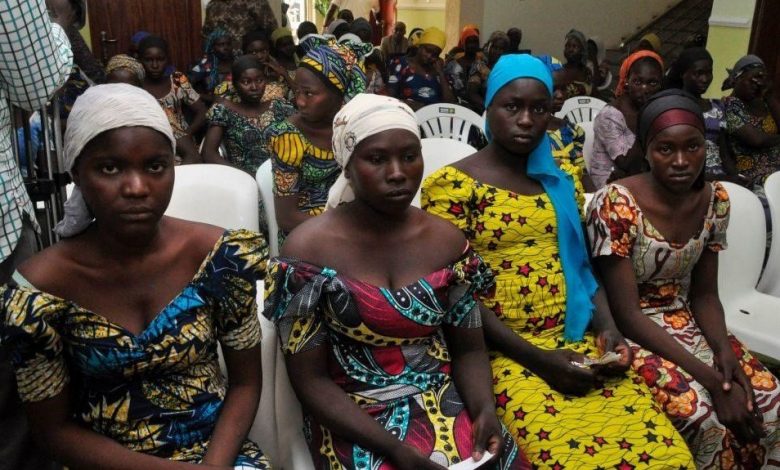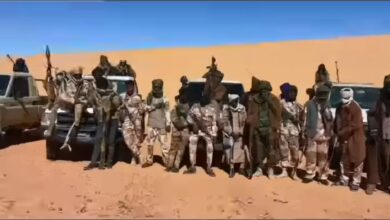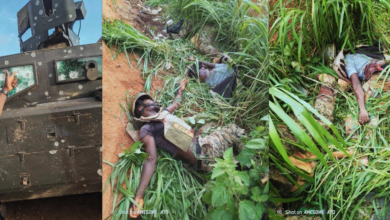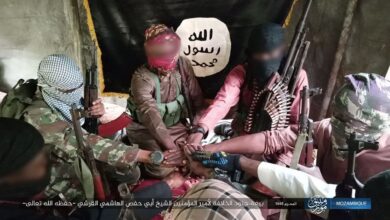Torture, Forced Marriages, Public Executions: Boko Haram’s Many Atrocities Against Children — Report

The activities of the dreaded jihadist group, Boko Haram, in the Northeast for over a decade have led to the physical and emotional abuse of children in many ways, says Amnesty International (AI).
In a report released on Wednesday, titled ‘We Dried Our Tears’: Addressing The Toll On Children of Northeast Nigeria’s Conflict, the international organisation said the abuses have both immediate and long-term devastating effects on the children even though little avenues for rehabilitation are available.
“Whether abducted or recruited into Boko Haram or just living in an area the group contests, boys and girls face an assault on their childhood—unable to obtain an education and often forcibly targeted to be ‘wives’ or soldiers,” it stated in the executive summary.
“Almost everyone in the Northeast has been affected, but the impact on girls and boys has been and continues to be particularly pronounced. Absence of a major shift in strategy by the Nigerian authorities; an entire generation may be lost.”
Amnesty International said it carried out its research between November 2019 and April 2020 and based their findings on interviews with over 230 people affected by the conflict, including 119 children who have suffered direct consequences in the Northeast.
The abuses suffered at the hands of Boko Haram members by children include repeated torture, forced Qur’anic literacy and conversion, public executions, forced marriages, sexual assaults, and so on.
A 17-year-old girl from Madagali, Adamawa, identified by the acronym E.G., narrated how she was abducted in 2014 and eventually escaped from Boko Haram captivity with two children, four years later.
After Gulak was attacked, E.G. was caught alongside other residents of the village who were trying to escape. They were locked inside a house for three months and were labelled “unbelievers” for being Christians. She said all they did while in the house was compulsorily learn the Qur’an thrice daily.
She was then married off to a member in “some sort of marriage ceremony” without the groom present and then taken to Sambisa Forest where she was introduced to her “husband”.
“He was a wicked ‘husband’ and always beat me, saying I didn’t study the Qur’an. My daily activities included praying, cooking if there was food, [and] going for Quranic lessons,” E.G. said.
“No movement was allowed, and no visiting friends… It was a terrible experience, and I witnessed different punishments, from shooting to stoning to lashing. I once witnessed the stoning of a Boko Haram member accused of rape. They buried him in a grave, leaving only his head, and then they stoned the head until he died.”
She started planning how to escape with nine other women, but members of the terror group got wind of the plan and waylaid them. She, however, narrowly escaped with her babies, a two-year-old boy tied to her back and her four-month-old girl wrapped in her arms.
When she got to a military post, the soldiers gave them food and took them to the Internally Displaced Persons (IDP) camp in Bama. She said she had no access to psychosocial support or counselling while at the camp despite her traumatic experience.
“I’d like to go to school, but there’s no money. My parents can’t send me because they don’t have the money. The biggest help for me would be to go to school,” the young girl said.
Amnesty International observed that Boko Haram’s methods of forcefully recruiting “child soldiers”, taking hostages, and marrying young girls violate international humanitarian and human rights laws that offer special protection for children.
The organisation said many children who have been abducted by Boko Haram remain unaccounted for and said it spoke with 44 people who confirmed to have been kidnapped by the group as children.
“When Boko Haram came, they pointed a gun at my grandfather’s head and said they would kill him if he did not let them take me, my mother, and my uncle, away. So, he let them take us, and they took us to Sambisa,” one 11-year-old boy from Michika, Adamawa State, told AI.
Amnesty International said its research indicates that “commonly reported statistics on Boko Haram abductions, including UNICEF data that ‘at least 1,000 children’ have been abducted, woefully understate the scale”.
“The three mass incidents described at the start of the section alone total around 700 child abductions. Baga, Gwoza, Bama, Michika, Gulak, and Madagali seem very likely to total at least as many, if not double, or more, and still would not account for the regular abductions in Boko Haram-controlled areas,” it explained.
Boko Haram is known to have recruited thousands of children to join its rank of fighters, appearing to favour conscription by force over “voluntary” methods in its later years. Former child soldiers, mostly recruited before their 15th birthday, narrated how they were trained in gun shooting and assumed defensive positions.
AI said it also interviewed 13 women and girls who were forced to marry members of the insurgent group.
“Most were between 13 and 16 years old at the time of ‘marriage’; one was as young as 11. Among those interviewed, a few older girls and younger women were already married in their community when Boko Haram captured them and forcibly re-‘married’ them to a fighter. Refusal to ‘marry’ results in prolonged detention at best, and often with torture or even death,” it said.
Some of the girls whose successive husbands were killed, forced to become suicide bombers instead of being remarried a third time, according to AI.
Children in Boko Haram captivity also forced to witness and commit grievous atrocities, including killings, may have long-term devastating effects on mental health.
“During attacks, Boko Haram fighters have often forced children to witness the killing or abduction of their parents and siblings. Such atrocities continue, though appear to have been more frequent during previous periods of the conflict,” Amnesty International noted.
Thirty-four people had described witnessing, as children, the killing or abduction of family members or close friends by the group.
An 11-year-old girl from Gwoza, Borno State, recounted how her father was killed in front of his wife and children during an attack in 2014. He had hidden under the bed after hearing sounds of motorcycles but was found and dragged outdoors.
“They were four [Boko Haram] boys that came to our house,” she said.
“They took him to a tree in our compound; my father kept begging, asking them, ‘Please, you people should leave me. Please, because of God, you people shouldn’t kill me, look at my children. Please don’t kill me.’ They asked him to keep quiet… He was still talking, then [a fighter] quickly brought a knife to [my dad’s] throat and started slaughtering him.
“My mom started screaming, and they told her, ‘If you don’t keep quiet, we’ll kill you next and kill all the children.’ We put our faces inside our hijab and were crying so they wouldn’t see, and before we brought them out, we dried our tears… After killing him, they put my mom in a car and took her away… She had my little brother on her back. They also took four of my older sisters… I don’t know if they’re still alive.”
Children captured by Boko Haram were denied rights to recreation and interact with their agemates. Also, accounts from various witnesses and victims substantiate reports about the punishment and killing of child-captives who tried to flee and attacks on schools as well as teachers to discourage secular education.
“Many children interviewed never returned to school after the Boko Haram attack, due to a combination of years spent in Boko Haram territory without access to education; being detained for months or years by the military after fleeing; and the challenge of finding livelihoods to pay for school fees, at times compounded by the death or detention of parents or other caregivers,” AI observed.
“Boko Haram’s attacks, and the shortcomings of the Nigerian government response, have ultimately denied education to a large part of an entire generation of children and young adults.”
It urged to ensure access to education in the Northeast and promote the well-being and reintegration of children affected by abductions and terrorist attacks.
“Invest substantially, with assistance from donors, in psychosocial support that meets the specific risks and needs of children, among other at-risk groups,” the organisation recommended.
Support Our Journalism
There are millions of ordinary people affected by conflict in Africa whose stories are missing in the mainstream media. HumAngle is determined to tell those challenging and under-reported stories, hoping that the people impacted by these conflicts will find the safety and security they deserve.
To ensure that we continue to provide public service coverage, we have a small favour to ask you. We want you to be part of our journalistic endeavour by contributing a token to us.
Your donation will further promote a robust, free, and independent media.
Donate Here




